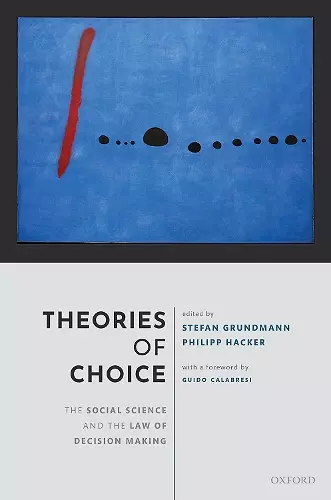Theories of Choice
The Social Science and the Law of Decision Making
Stefan Grundmann editor Philipp Hacker editor
Format:Hardback
Publisher:Oxford University Press
Published:14th Jan '21
Currently unavailable, and unfortunately no date known when it will be back

Choice is a key concept of our time. It is a foundational mechanism for every legal order in societies that are, politically, constituted as democracies and, economically, built on the market mechanism. Thus, choice can be understood as an atomic structure that grounds core societal processes. In recent years, however, the debate over the right way to theorize choice - for example, as a rational or a behavioral type of decision making - has intensified. This collection provides an in-depth discussion of the promises and perils of specific types of theories of choice. It shows how the selection of a specific theory of choice can make a difference for concrete legal questions, in particular in the regulation of the digital economy or in choosing between market, firm, or network. In its first part, the volume provides an accessible overview of the current debates about rational versus behavioral approaches to theories of choice. The remainder of the book structures the vast landscape of theories of choice along with three main types: individual, collective, and organizational decision making. As theories of choice proliferate and become ever more sophisticated, however, the process of choosing an adequate theory of choice becomes increasingly intricate. This volume addresses this selection problem for the various legal arenas in which individual, organizational, and collective decisions matter. By drawing on economic, technological, political, and legal points of view, the volume shows which theories of choice are at the disposal of the legally relevant decision-maker, and how they can be operationalized for the solution of concrete legal problems. The editors acknowledge the kind support of the Fritz Thyssen Foundation for an exploratory conference on the subject of the book.
This collection provides an in-depth discussion of the promises and perils of specific types of theories of choice. Moreover, it shows how the selection of a specific theory of choice can make a difference for concrete legal questions, particularly in the regulation of the digital economy or choosing between market, firm, or network. * Lucia A. Reisch and Friederike C. Doebbe, Journal of Consumer Policy *
This is a wide-ranging and hugely well-informed study of choice and its relationship with law and legal studies. The inclusion of responses to practical issues such as investor voting behaviour and networks of commercial contracts demonstrates a concerted attempt to link theory to practice. Any legal text that attempts interdisciplinary research (of sorts) with quantum physics is worth a look. * Tom Proverbs-Garbett, Law Society Gazette *
Choice is a foundational mechanism for every legal order in societies that are, politically, constituted as democracies and, economically, built on the market mechanism...The book provides an in-depth discussion of the promises and perils of specific types of theories of choice. * Journal of Consumer Policy *
The book provides an in-depth discussion of the promises and perils of specific types of theories of choice. It shows how the selection of a specific theory of choice can make a difference for concrete legal questions, in the regulation of the digital economy or in choosing between market, firm, or network. * Journal of Consumer Policy *
The book provides an in-depth discussion of the promises and perils of specific types of theories of choice... the volume provides an accessible overview of the current debates about rational versus behavioural approaches to theories of choice. * Journal of Consumer Policy *
ISBN: 9780198863175
Dimensions: 240mm x 164mm x 24mm
Weight: 684g
352 pages